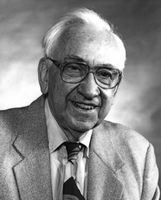Difference between revisions of "Guenther, H."
| Line 12: | Line 12: | ||
|yearbirth=1917/03/17 | |yearbirth=1917/03/17 | ||
|yeardeath=2006/03/11 | |yeardeath=2006/03/11 | ||
| − | |bio=Guenther was born in Bremen, Germany, in 1917. He studied in Munich and Vienna, and then taught at Vienna University from 1943 to 1950. He then lived and taught in India, at Lucknow University from 1950 to 1958, and the Sanskrit University in Varanasi from 1958 to 1963. He then went to the University of Saskatchewan in Canada. This biographical information is from the festschrift volume | + | |bio=Guenther was born in Bremen, Germany, in 1917. He studied in Munich and Vienna, and then taught at Vienna University from 1943 to 1950. He then lived and taught in India, at Lucknow University from 1950 to 1958, and the Sanskrit University in Varanasi from 1958 to 1963. He then went to the University of Saskatchewan in Canada. This biographical information is from the festschrift volume ''Buddhist Thought and Asian Civilization'', Leslie S. Kawamura and Keith Scott (eds.) (Dharma Press 1977). This book also has a bibliography of Guenther's works up to that point. |
|IsInGyatsa=No | |IsInGyatsa=No | ||
|classification=People | |classification=People | ||
Revision as of 13:27, 28 February 2020
| English Phonetics | Herbert V. Guenther |
|---|
| Birth: | 1917/03/17 |
|---|---|
| Death: | 2006/03/11 |
Tibetan calendar dates
Biographical Information
Guenther was born in Bremen, Germany, in 1917. He studied in Munich and Vienna, and then taught at Vienna University from 1943 to 1950. He then lived and taught in India, at Lucknow University from 1950 to 1958, and the Sanskrit University in Varanasi from 1958 to 1963. He then went to the University of Saskatchewan in Canada. This biographical information is from the festschrift volume Buddhist Thought and Asian Civilization, Leslie S. Kawamura and Keith Scott (eds.) (Dharma Press 1977). This book also has a bibliography of Guenther's works up to that point.
- Wiki Pages
- Person description or short bio
Expand to see this person's philosophical positions on Buddha-nature.
| Is Buddha-nature considered definitive or provisional? | |
|---|---|
| Position: | |
| Notes: | |
| All beings have Buddha-nature | |
| Position: | |
| If "Qualified", explain: | |
| Notes: | |
| Which Wheel Turning | |
| Position: | |
| Notes: | |
| Yogācāra vs Madhyamaka | |
| Position: | |
| Notes: | |
| Zhentong vs Rangtong | |
| Position: | |
| Notes: | |
| Promotes how many vehicles? | |
| Position: | |
| Notes: | |
| Analytic vs Meditative Tradition | |
| Position: | |
| Notes: | |
| What is Buddha-nature? | |
| Position: | |
| Notes: | |
| Svātantrika (རང་རྒྱུད་) vs Prāsaṅgika (ཐལ་འགྱུར་པ་) | |
| Position: | |
| Notes: | |
| Causal nature of the vajrapāda | |
| Position: | |
Full Name[edit]
Herbert V. Guenther
Herbert V. Günther on Wikipedia
Affiliation[edit]
Other Information[edit]
Guenther was born in Bremen, Germany, in 1917. He studied in Munich and Vienna, and then taught at Vienna University from 1943 to 1950. He then lived and taught in India, at Lucknow University from 1950 to 1958, and the Sanskrit University in Varanasi from 1958 to 1963. He then went to the University of Saskatchewan in Canada. This biographical information is from the festschrift volume Buddhist Thought and Asian Civilization, Leslie S. Kawamura and Keith Scott (eds.) (Dharma Press 1977). This book also has a bibliography of Guenther's works up to that point.
Quotes[edit]
"1. To give an example, if someone were to 'translate' the French il a le mal de tête as 'he has the evil of the earthenware pot,' which is the correct philological rendering and then were to claim that this is what the French understood by that phrase, he would be considered insane, but when someone proclaims such absurdities as 'embryo of Tathāgatha,' 'substantial body', 'eminated incarnation Body,' and so on, which are not even philologically correct but merely reveal utter incomprehension of the subject matter, by a strange volte-face, he is said to be a scholar.
~ "Bodhisattva - The Ethical Phase in Evolution" in The Bodhisattva Doctrine in Buddhism , pp 123, note 1.
